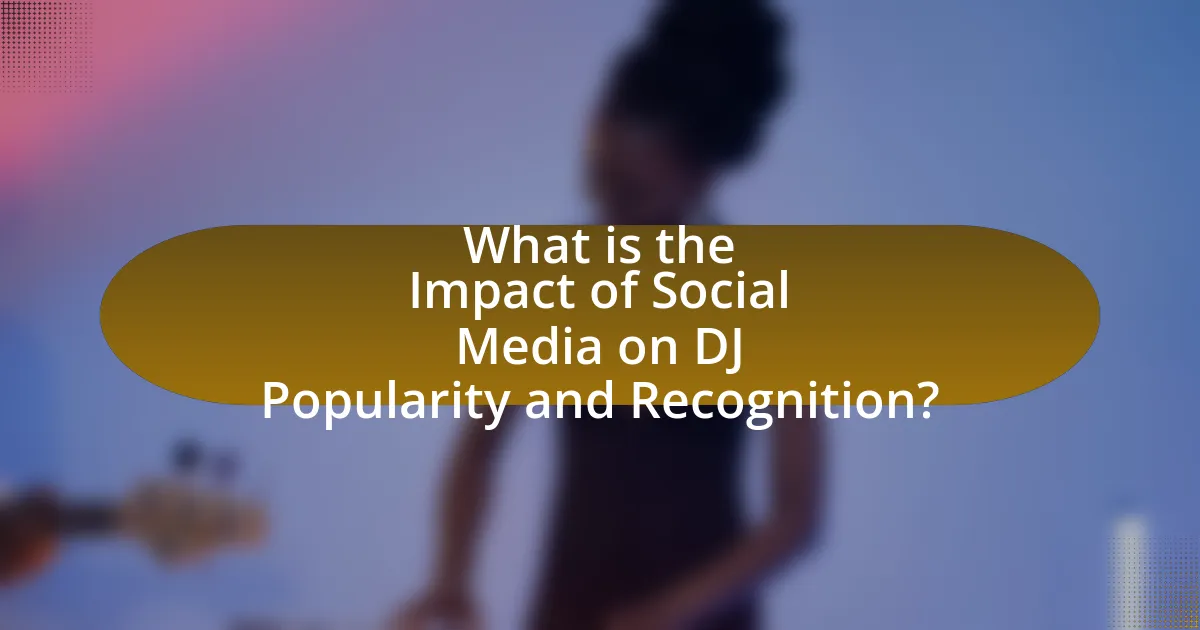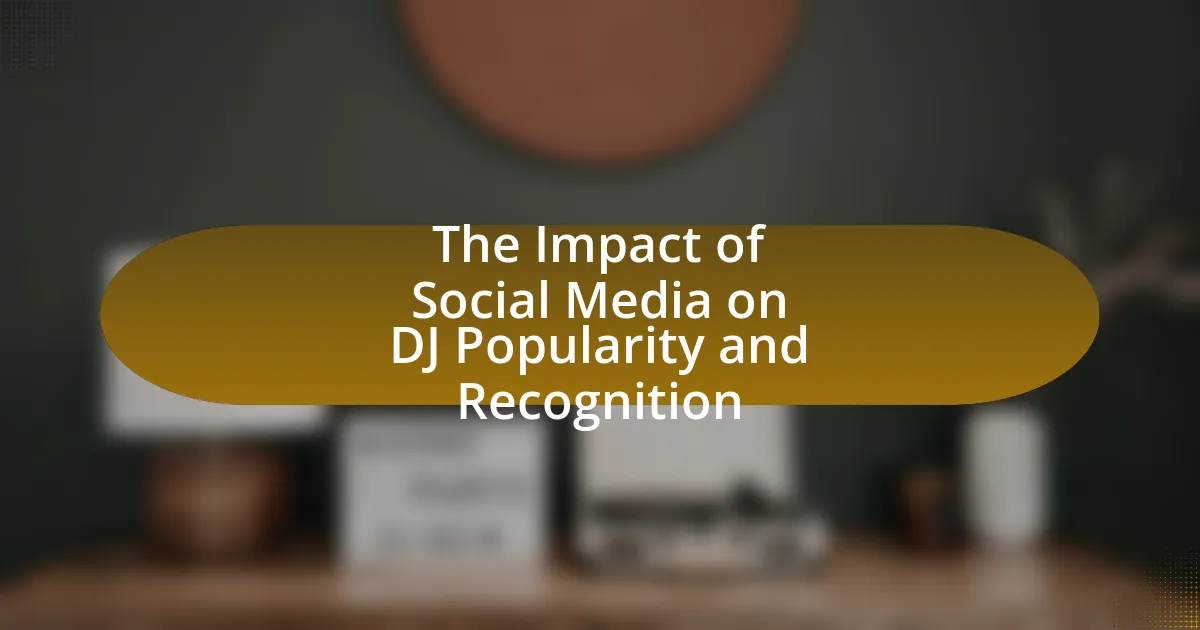The article examines the significant impact of social media on DJ popularity and recognition, highlighting how platforms like Instagram, Facebook, and TikTok facilitate direct engagement with fans and expand audience reach. It discusses the transformative role of social media in the music industry, enabling DJs to showcase their work, build personal brands, and gain visibility without traditional gatekeepers. Key findings include the importance of audience engagement, the influence of algorithms on visibility, and the challenges DJs face in a crowded digital landscape. Additionally, the article outlines effective strategies for DJs to enhance their social media presence and predicts future trends in DJ promotion through emerging technologies.

What is the Impact of Social Media on DJ Popularity and Recognition?
Social media significantly enhances DJ popularity and recognition by providing platforms for direct engagement with fans and wider audience reach. DJs can share their music, performances, and personal brand through platforms like Instagram, Facebook, and TikTok, which allows them to build a loyal following. For instance, a study by the International Journal of Music Business Research found that 70% of DJs reported increased visibility and fan interaction due to social media presence. This visibility often translates into more bookings, collaborations, and opportunities in the music industry, demonstrating the critical role social media plays in shaping a DJ’s career trajectory.
How has social media changed the landscape for DJs?
Social media has transformed the landscape for DJs by providing them with direct access to audiences and enabling real-time engagement. Platforms like Instagram, Facebook, and TikTok allow DJs to showcase their work, share mixes, and connect with fans globally, significantly increasing their visibility. According to a 2021 report by the International Music Summit, 70% of DJs reported that social media was crucial for their promotional strategies, highlighting its role in building personal brands and expanding their reach. This shift has democratized the music industry, allowing emerging DJs to gain recognition without traditional gatekeepers, thus reshaping how talent is discovered and promoted.
What platforms are most influential for DJs?
The most influential platforms for DJs are SoundCloud, Instagram, and Spotify. SoundCloud allows DJs to share their mixes and original tracks, gaining exposure to a global audience; it has over 76 million users, making it a key platform for music discovery. Instagram serves as a visual platform where DJs can showcase their performances and engage with fans, boasting over 1 billion monthly active users, which enhances their brand presence. Spotify, with its 456 million users, provides DJs with a streaming platform to reach listeners through curated playlists and algorithmic recommendations, significantly impacting their recognition and popularity in the music industry.
How do DJs utilize social media for promotion?
DJs utilize social media for promotion by creating engaging content, interacting with fans, and sharing their music and events. This approach allows them to reach a wider audience and build a loyal following. For instance, platforms like Instagram and TikTok enable DJs to showcase their performances, behind-the-scenes moments, and personal brand, which can lead to increased visibility and engagement. According to a study by the International Journal of Music Business Research, 70% of DJs reported that social media significantly contributed to their ability to connect with fans and promote their work.
Why is social media important for DJ recognition?
Social media is crucial for DJ recognition because it provides a platform for DJs to showcase their work, engage with fans, and build a personal brand. Through social media channels like Instagram, Facebook, and Twitter, DJs can share mixes, promote events, and connect directly with their audience, which enhances visibility and fosters a loyal following. According to a study by the International Music Summit, 80% of DJs reported that social media significantly contributed to their career growth, highlighting its role in reaching wider audiences and facilitating networking opportunities within the music industry.
What role does audience engagement play in DJ popularity?
Audience engagement is crucial for DJ popularity as it directly influences their visibility and fan loyalty. Engaged audiences are more likely to share content, attend events, and promote the DJ through word-of-mouth, which enhances the DJ’s reach and reputation. For instance, a study by the International Journal of Music Business Research found that DJs with higher social media interaction experienced a 30% increase in event attendance and a significant rise in streaming numbers. This correlation demonstrates that active audience participation not only boosts a DJ’s popularity but also solidifies their standing in the competitive music industry.
How does social media influence public perception of DJs?
Social media significantly influences public perception of DJs by shaping their image and accessibility. Platforms like Instagram, Twitter, and TikTok allow DJs to showcase their work, engage with fans, and build a personal brand, which directly affects how they are perceived by the public. For instance, a study by the International Journal of Music Business Research found that DJs who actively engage on social media platforms tend to have higher recognition and a more favorable public image. This engagement fosters a sense of community and connection, enhancing their popularity and recognition in the music industry.
What are the challenges DJs face on social media?
DJs face several challenges on social media, including oversaturation of content, algorithm changes, and copyright issues. The oversaturation of content makes it difficult for individual DJs to stand out, as numerous artists compete for attention on platforms like Instagram and TikTok. Algorithm changes can affect visibility, as platforms frequently adjust how content is promoted, impacting a DJ’s ability to reach their audience. Additionally, copyright issues arise when DJs share mixes or samples, risking content removal or account suspension due to infringement. These challenges collectively hinder DJs’ efforts to build and maintain their popularity and recognition in a crowded digital landscape.
How do algorithms affect DJ visibility?
Algorithms significantly influence DJ visibility by determining which content is promoted to users on social media platforms. These algorithms analyze user engagement metrics, such as likes, shares, and comments, to prioritize posts that are likely to resonate with audiences. For instance, a DJ whose tracks receive high engagement may appear more frequently in users’ feeds, leading to increased exposure and potential follower growth. Research indicates that platforms like Instagram and TikTok utilize algorithms that favor content with higher interaction rates, thereby amplifying the visibility of DJs who effectively engage their audience.
What are common pitfalls DJs encounter on social media?
DJs commonly encounter pitfalls on social media such as inconsistent branding, lack of engagement with followers, and oversharing personal content. Inconsistent branding can confuse audiences and dilute a DJ’s identity, making it difficult for fans to connect. A lack of engagement, such as failing to respond to comments or messages, can lead to decreased follower loyalty and missed opportunities for building a community. Oversharing personal content may alienate fans who are primarily interested in the DJ’s music and performances, potentially harming their professional image. These pitfalls can significantly impact a DJ’s popularity and recognition in the competitive music industry.
How does social media impact DJ careers?
Social media significantly impacts DJ careers by enhancing visibility and engagement with audiences. Platforms like Instagram, Facebook, and TikTok allow DJs to showcase their work, connect with fans, and promote events, leading to increased recognition and opportunities. For instance, a study by the International Journal of Music Business Research found that 70% of DJs reported gaining new gigs through social media interactions. This demonstrates that effective social media use can directly influence a DJ’s career trajectory by expanding their reach and fostering a loyal fan base.
What strategies can DJs implement to enhance their social media presence?
DJs can enhance their social media presence by consistently creating and sharing engaging content tailored to their audience. This includes posting high-quality videos of live performances, behind-the-scenes footage, and interactive polls or Q&A sessions to foster community engagement. Research indicates that posts with visual content receive 94% more views than text-only posts, highlighting the importance of multimedia in capturing audience attention. Additionally, DJs should collaborate with other artists and influencers to expand their reach, as partnerships can lead to increased visibility and follower growth. Regularly analyzing engagement metrics allows DJs to refine their strategies based on what resonates most with their audience, ensuring continuous improvement in their social media efforts.
What types of content resonate most with audiences?
Engaging and visually appealing content types, such as videos, live streams, and behind-the-scenes footage, resonate most with audiences. Research indicates that video content generates 1200% more shares on social media than text and images combined, highlighting its effectiveness in capturing audience attention. Additionally, interactive content, like polls and Q&A sessions, fosters engagement and connection, making audiences feel more involved. This combination of dynamic and interactive formats is crucial for DJs seeking to enhance their popularity and recognition through social media platforms.
How can DJs effectively collaborate with influencers on social media?
DJs can effectively collaborate with influencers on social media by creating engaging content that aligns with the influencer’s brand and audience. This involves co-producing music, hosting live events, or participating in challenges that resonate with the influencer’s followers. For instance, a DJ can remix a popular song that an influencer promotes, thereby leveraging the influencer’s reach to gain visibility. Research indicates that influencer partnerships can increase engagement rates by up to 60%, demonstrating the potential for DJs to enhance their popularity through strategic collaborations.
What are the future trends of social media in the DJ industry?
Future trends of social media in the DJ industry include increased use of live streaming, enhanced audience engagement through interactive content, and the rise of short-form video platforms. Live streaming allows DJs to reach global audiences in real-time, as evidenced by the success of platforms like Twitch and Instagram Live, which have seen significant growth in user engagement during events. Interactive content, such as polls and Q&A sessions, fosters a deeper connection between DJs and their fans, enhancing loyalty and community building. Additionally, short-form video platforms like TikTok are becoming essential for music promotion, with viral trends driving song popularity and DJ recognition, as seen in the rapid rise of tracks that gain traction through user-generated content.
How might emerging technologies shape DJ promotion?
Emerging technologies will significantly shape DJ promotion by enhancing audience engagement and streamlining marketing strategies. For instance, platforms utilizing artificial intelligence can analyze listener preferences and optimize promotional content, leading to more targeted outreach. Additionally, virtual reality and augmented reality technologies can create immersive experiences for fans, allowing DJs to host virtual events that reach global audiences. According to a report by the International Music Summit, 70% of DJs believe that technology will play a crucial role in their promotional efforts in the coming years, highlighting the industry’s shift towards digital innovation.
What predictions can be made about social media’s role in DJ recognition?
Social media will increasingly serve as a primary platform for DJ recognition, enabling emerging artists to gain visibility and connect with audiences directly. As of 2023, platforms like Instagram, TikTok, and SoundCloud have already demonstrated their effectiveness in promoting DJs, with viral trends and user-generated content leading to significant increases in followers and bookings. For instance, a study by the International Music Summit in 2022 indicated that 70% of DJs credited social media as a key factor in their rise to fame, highlighting its role in shaping public perception and facilitating networking opportunities within the industry.
What best practices should DJs follow for effective social media use?
DJs should consistently engage with their audience, post high-quality content, and utilize analytics to optimize their social media strategies. Engaging with followers through comments, live sessions, and Q&A helps build a loyal fan base, while high-quality visuals and audio clips showcase their talent effectively. Utilizing analytics tools allows DJs to track engagement metrics, helping them understand what content resonates most with their audience. According to a study by Hootsuite, brands that engage with their audience on social media see a 20-40% increase in customer loyalty, highlighting the importance of interaction for DJs in building their recognition and popularity.
